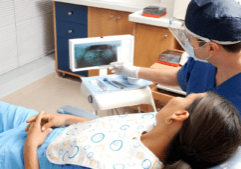The United States Department of Health and Human Services has issued strict guidelines for healthcare information privacy under the Health Insurance Portability and Accountability Act of 1996, known commonly as the “HIPAA” act. All medical practices, including dental providers, must comply with the terms of this act.
Demand for strict compliance adherence means dental practices need robust communications systems to govern client-to-patient interactions. Dental practices need to build robust communications systems to ensure complete compliance with government regulations and the full confidence of their patients.
Who Must Abide By HIPAA?
Any medical services provider that receives, stores, and manages Personal Health Information abbreviated PHI, for customers must abide by the HIPAA Act. This includes dental practices who would make any insurance claim for care provided to a patient or who may transfer information directly to a patient over a telecommunications system.
The American Dental Association explained that the regulation applies to all insurance “covered entities” and “business associates” of a practice. Dental offices and all their business associates, including telecommunications providers, must meet HIPAA standards to be considered fully compliant.
When a dentist’s office files a claim to an insurance provider electronically, it becomes an entity that must abide by HIPAA. The communications system used to transfer the claim must also comply. A system that complies by HIPAA regulations is commonly referred to as HIPAA VoIP.
The United States Department of Health and Human Services explains that all service providers for HIPAA-abiding practices must sign a business associate contract. Business associate contracts establish the practice and the service provider’s business relationship.
Communication Security and Patient Information
With analog call systems, determining who will answer the intended message can be challenging for medical practice. Under HIPAA regulations, patient confidentiality must be guaranteed. A patient’s PHI should only be sent directly to a patient, not someone else in that patient’s household or circle. The HIPAA guidelines have established these standards to prevent a third party from exploiting a person’s PHI.
With standard telecommunications, a practice could unintentionally violate HIPAA. For example, if a dentist sends a patient information about the results of an appointment result via an SMS and that patient’s phone is stolen, someone other than the patient may have access to that sensitive information.
Medical professionals use encrypted messaging apps for physician-to-patient communication to ensure the information is confidential. However, medical professionals opt for HIPAA VoIP for long-term, complete business services because of its reliability, cost-effectiveness, and security conference calling or messaging over a private broadband network rather than analog phone signals.
Costs of HIPAA Violations
The US government gave dental practices until August 9, 2023, to comply with renewed HIPPA regulations following the end of lockdown COVID-19 restrictions. With this notice came renewed challenges for companies to expeditiously comply with the law. Companies needed to guarantee whole-of-system compliance with rapid application, which has increased the demand for HIPAA VoIP providers that can accommodate many corresponding needs.
Non-compliance can be costly. The HIPPA Journal wrote that the average costs for violating range between $100 to $50,000 per violation, with the cost range of the fine depending on the “level culpability.”

In addition to fines, there are some cases where a HIPAA violation may carry criminal penalties. Medical professionals have the added challenge of ensuring their communications are top-of-the-line to avoid expensive fines and court proceedings.
How VoIP Works
VoIP allows an office to make calls through their broadband connection, saving costs on traditional telephone hardware and improving the speed of telecommunications. For medical practices, selecting a HIPAA VoIP can be an affordable way to file insurance claims or streamline telehealth and stay within regulations.
However, medical practices must always consider HIPAA regulations and how their system will adapt to make compliance steps actionable. By providing end-to-end encryption overall, VoIP systems ensure that the telecommunication network builds a holistic safety net for medical practices, providing them with the reliability and accessibility to improve telehealth standards.
How HIPAA VoIP Ensures Compliance
By providing end-to-end call encryption, VoIP can ensure dentists file claims within an environment that does not expose a patient’s personal health information to a third-party user. VoIP services are a cost-efficient and highly scalable alternative to ensuring communications are done within government expectations.
Worry-free HIPAA Compliance with Rhode Island Telephone
Rhode Island Telephone untangles business communications by providing a full-suite of business communications systems and installation services in Rhode Island, Massachusetts, and Connecticut. If you’re ready to get started, request a quote.




